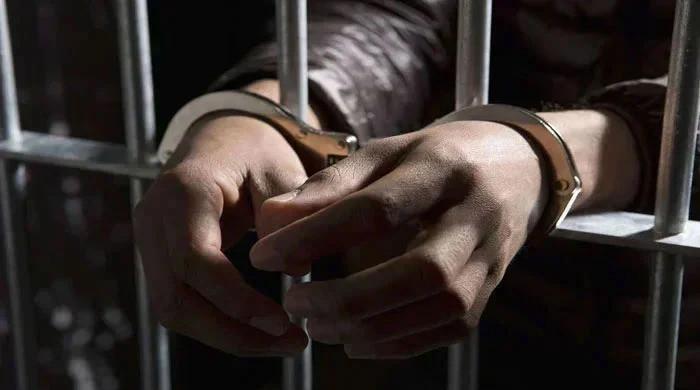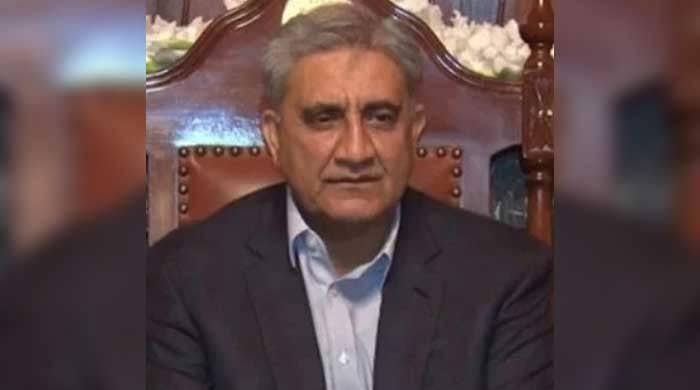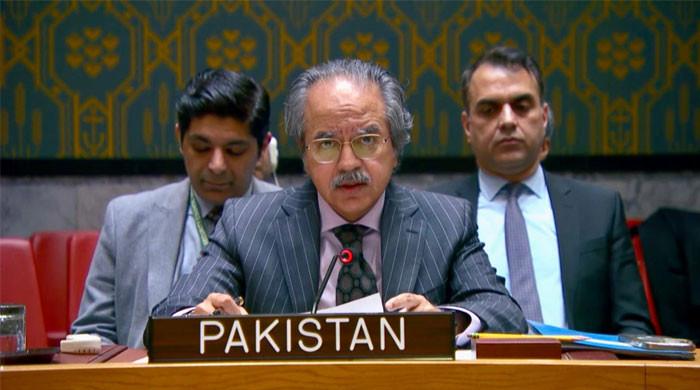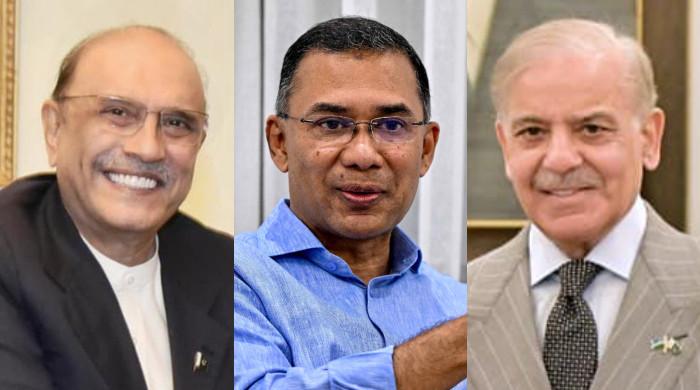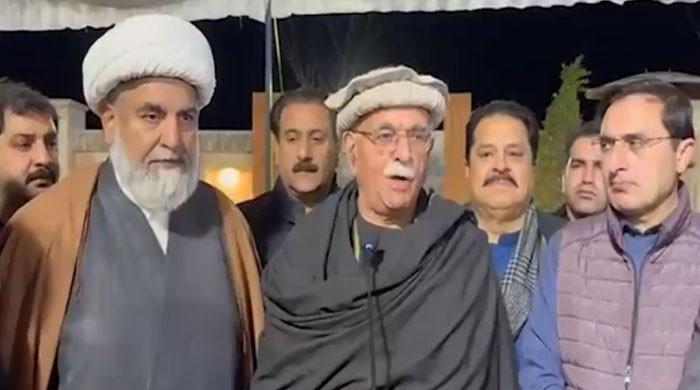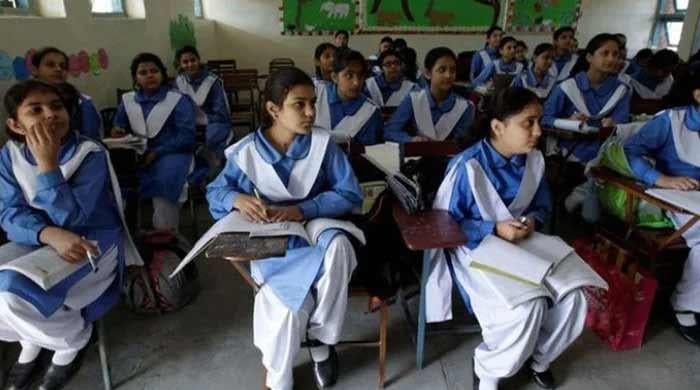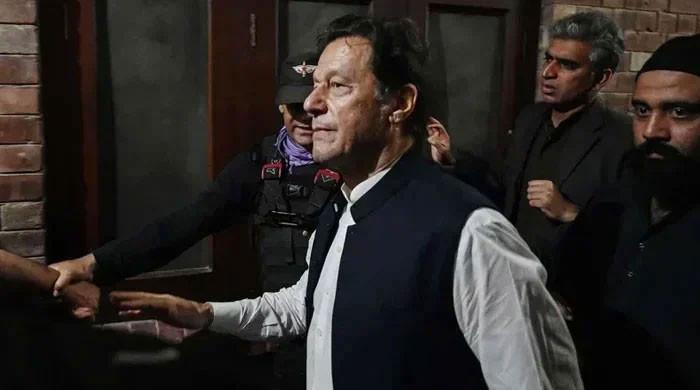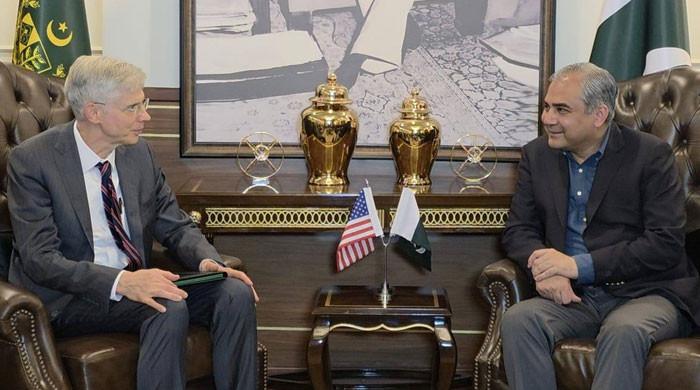Big blow to Imran Khan-founded party as SC declares PTI ineligible for reserved seats
SC constitutional bench accepts review petitions by majority of 7 to 5 judges, upholds PHC verdict
June 27, 2025
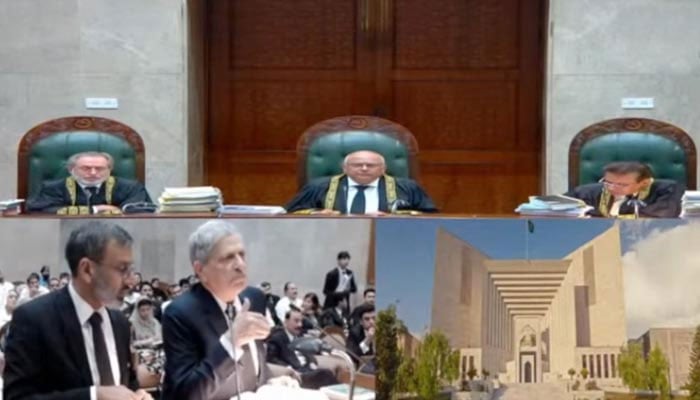
- SC bench upholds March 2024 ruling of PHC.
- 7:5 majority verdict announced by Justice Aminuddin.
- Justice Panhwar recuses himself from SC bench.
In a major setback for the Pakistan Tehreek-e-Insaf, the Supreme Court’s Constitutional Bench has accepted review petitions and ruled that the Imran Khan-founded party is not entitled to seats reserved for women and minorities in the national and provincial assemblies.
The verdict was announced by a 10-member bench headed by Justice Aminuddin Khan on Friday.
Announcing the short ruling, Justice Aminuddin Khan said, “Justice Aminuddin Khan, Justice Mussarat Hilali, Justice Naeem Akhtar Afghan, Justice Shahid Bilal Hassan, Justice Hashim Khan Kakar, Justice Aamir Farooq and Justice Ali Baqar Najafi all review petitions are allowed and impugn majority judgement dated July 12, 2024 is set aside as a consequence thereof civil appeals … filed by SIC are dismissed and judgement rendered by the PHC is restored.”
The head of the bench further said: “Whereas Justice Jamal Khan Mandokhail for reasons to be recorded, later the party allowed the review petitions and maintained its review petitions and maintained his original order with regard to 39 seats but reviewed the majority judgement to the extent of 41 seats. Whereas, Justice Mohammad Ali Mazhar and Justice Syed Hasan Azhar Rizvi, for reasons to be recorded later, also reviewed the judgement and allowed the review petitions with the rider that since the factual controversy or disputed questions of fact neither could be resolved by the PCH or this court in original or review jurisdiction. Therefore, directions are issued to the ECP to examine and consider the nomination papers/declaration and other relevant documents of all 80 returned candidates by means of noble exercise with regard to their affiliation …”
The Pakistan Muslim League-Nawaz (PML-N), the Pakistan Peoples Party (PPP), and the Election Commission of Pakistan have filed review petitions against last year's Supreme Court July 12, 2024 ruling that the Pakistan Tehreek-e-Insaf (PTI) was entitled to reserved seats for women and minorities in the national and provincial assemblies.
Justice Mansoor Ali Shah of the SC's full bench announced the 8-5 majority verdict, nullifying the Peshawar High Court's (PHC) order wherein it had upheld the Election Commission of Pakistan's (ECP) decision denying the reserved seats to the Sunni Ittehad Council (SIC).
In its July 12 verdict, eight out of 13 judges ruled that 39 out of a list of 80 MNAs were and are the returned candidates of the PTI.
What was July 24 verdict of SC?
Last year in July, the top court ruled that the PTI was eligible for the allocation of reserved seats.
The decision not only paved the way for the PTI's return to parliament, which was kicked out of the February 8 polls owing to the ECP's December 2023 ruling, but had also increased the pressure on the coalition alliance by changing the composition of the National Assembly.
Justice Mansoor Ali Shah of the SC's full bench announced the 8-5 majority verdict, nullifying the Peshawar High Court's (PHC) order wherein it had upheld the Election Commission of Pakistan's (ECP) decision denying the reserved seats to the SIC.
It was supported by a majority of eight judges, comprising Justice Syed Mansoor Ali Shah, Justice Munib Akhtar, Justice Muhammad Ali Mazhar, Justice Ayesha A. Malik, Justice Athar Minallah, Justice Syed Hasan Azhar Rizvi, Justice Shahid Waheed and Justice Irfan Saadat Khan.
The PTI candidates did not contest the polls on a single symbol, forcing them to join hands with the SIC, but that could not get the party the reserved seats as the ECP ruled against them.
In its decision, the court declared that the lack or denial of an election symbol does not in any manner affect the Constitutional or legal rights of a political party to participate in an election, whether general or by, and to field candidates and that the commission is under a Constitutional duty to apply all statutory provisions accordingly.
"PTI was and is a political party, which secured general seats in the national and provincial assemblies in the general elections of 2024," read the verdict.
According to the verdict, the PHC's judgment dated March 25 is set aside. "The order of the ECP dated March 1 is declared to be ultra vires to the Constitution, without lawful authority, and of no legal effect," it said.
The top court remarked that PTI, as a political party, has a legal and constitutional right to reserved seats.
Rejecting the appeals filed by the SIC, the apex court said that the party cannot take reserved seats as per the Constitution.
The ruling said that the PTI should present a list of eligible candidates for the reserved seats to the electoral body within 15 days after the verdict.
It added that the ECP should then publish the list of reserved seats of the candidates on its website within seven days.
"The seats allocated to the PTI after this stage will be considered as their seats. [Once the PTI gets its seats in parliament], it will be eligible for the reserved seats," said the ruling.
However, former CJP Qazi Faez Isa and Justice Jamal Khan Mandokhail had a differing order, which was supported by Justice Amin-ud-Din Khan and Naeem Akhtar Afghan.
Meanwhile, Justice Yahya Afridi differed with it, stating that the PTI fulfils the conditions prescribed for a political party under the enabling provisions of the Constitution and the law to allocate reserved seats for women and non-Muslims, but SIC doesn't.
He directed the ECP to decide the allocation of reserved seats for women and non-Muslims to political parties in the NA and provincial assemblies, after hearing all the parties concerned, and revisit its earlier decisions, within seven days.
Reserved seats saga
The reserved seats' issue first emerged after over 80 PTI-backed independent candidates emerged victorious in the February 8 elections and subsequently joined the SIC in a bid to claim seats reserved for minorities and women.
The SIC then approached the ECP on February 21 seeking allocation of reserved seats. However, the PTI suffered a setback after the electoral body, citing the party's failure to submit its list of candidates, denied allocating the reserved seats to the SIC via its 4-1 majority verdict on March 4.
In the verdict, the ECP said it extended the deadline to submit a priority list for the reserved seats of women, and the SIC, before the February 8 polls, did not submit the required list which was "mandatory".
The electoral body's verdict cited Article 51(6), saying the article clearly stated the reserved seats would be allocated to the political parties who contested elections and won general seats based on a "proportional representation system".
While rejecting the plea of SIC, the ECP accepted applications of the opposing parties and decided that the seats in the National Assembly would not remain vacant and be allocated by a proportional representation process of political parties on the basis of seats won by political parties.
The electoral body said the SIC cannot claim the share in the reserved seats for the women "due to non-curable procedural and legal defects and violations of mandatory provisions of the Constitution".
The party then approached the PHC on March 6, which upheld the electoral body's decision on the matter in its March 14 ruling.
Subsequently, on April 2, the SIC moved the SC seeking to set aside the PHC verdict and the allocation of 67 women and 11 minority seats in the assemblies.
The allocation of reserved seats holds significance as the PTI-backed independent candidates, who make up the majority of the opposition benches, lost as many as 77 reserved seats in NA and provincial assemblies due to the PHC's verdict.
It is to be noted that the PHC verdict allowing the allocation of reserved seats to the ruling coalition comprising the Pakistan Muslim League-Nawaz (PML-N), the Pakistan Peoples Party (PPP) and others, led to them securing a two-thirds majority in the National Assembly.
In the National Assembly, the PML-N was allocated 14 seats and the PPP and the Jamiat Ulema-e-Islam-Fazl (JUI-F) were given five and three additional seats, respectively.
The move propelled the PML-N's number in the lower house to 123, and PPP to 73, whereas the PTI-backed SIC number stood at 82.
In the Khyber Pakhtunkhwa Assembly, the JUI-F was given 10 seats, the PML-N was allocated seven, whereas the Awami National Party got one reserved seat.
In Punjab, the PML-N got 23, the PPP secured two, whereas the Istehkam-e-Pakistan Party (IPP) and the Pakistan Muslim League-Quaid (PML-Q) got one reserved seat each.
Meanwhile, in the Sindh Assembly, the PPP and the Muttahida Qaumi Movement-Pakistan were allocated two and one seats, respectively.
A three-member SC bench comprising Justice Mansoor, Justice Minallah and Justice Mazhar, took up the SIC's plea on June 6 and suspended PHC's verdict as well as the ECP's decision on the said issue.
Following the SC's decision to suspend the ECP order, the coalition lost its two-thirds majority in the lower house.
A 13-member full-court bench, constituted on May 31, then took up the issue and held a total of nine hearings on the crucial matter — the first hearing being conducted on June 3.
The SIC's plea, however, was opposed by both the federal government and the electoral body.
In its submission to the court via Attorney General of Pakistan (AGP) Mansoor Usman Awan, the government urged the apex court to reject the SIC's plea stressing that the reserved seats for minorities and women could be given to a political party which contested the polls and won at least one seat besides providing a list of candidates based on the total number of seats it won as per the law.
Meanwhile, the ECP also adopted a somewhat similar argument contending that the party is not eligible to get reserved seats as it did not submit the list of candidates before the January 24 deadline.
Furthermore, the PML-N also submitted its written arguments before the court that the SIC is not entitled to the reserved seats as it neither contested the February 8 polls nor provided the list of candidates.
It also argued that the party didn't win a single seat, which as per the written submission, was necessary to qualify for the allocation of reserved seats.
"None of the members of SIC contesting for the reserved seats filed their nomination papers let alone with the mandatory requirement of filing them with the list," it said, adding that since the nomination papers were never filed, the same were never scrutinised and none was held eligible to contest the elections.




